Most people begin their poker journey well away from the bright lights and noise of a casino or public card room. But whether the starting point is a home game with friends at the kitchen table, or the convenience of online poker, many players eventually wish to experience live casino poker.
Like any new experience in a social setting, your first time in a poker room may be a little intimidating. And if you’re completely new to poker, you might want to hold off on that first trip and read this beginner’s guide first. The purpose of the current article is to explain everything you need to know to play poker in a casino, from getting seated in a game to ensuring you have the most positive and enjoyable time while you’re there.
So grab some cash, and get ready to play your first casino session.
Finding A Poker Game
You can first enhance your poker experience before you even leave your home or hotel room. Nearly all U.S. and Canadian poker rooms can be found on the Bravo Poker app. (L.A. is a notable exception, but the huge rooms in that market will invariably have a seat for you when you arrive.) Its primary function is to list all poker games currently being played, including wait lists where appropriate. There’s also a one-touch feature to phone each room.
This app allows you to plan ahead, particularly in markets like Las Vegas where you’re likely to have multiple options for games that suit you. To speed up getting seated once you arrive at your chosen casino, you can phone in to have your name placed on a list. Just provide your first name (and surname initial if your name is more common than “Kat”) and the game type you want to play; for example, $1/$3 no-limit hold’em.
Alternatively, you can take care of all this in person at the casino.
If you are coming from online poker or a nickel-and-dime home game, you might be a little intimidated by the fact that the smallest stakes in a US casino involve $1/$2 blinds. Putting a couple of hundred bucks in play as a casino newbie is clearly a significant step up from an online microstakes game.
Whether this impacts you at all likely reflects your personal financial situation as much as anything else. The good news is that a $1/$2 casino game will often be softer than a 25NL online one. That said, for many players their first casino game will involve the highest stakes they have ever played. In the video below, SplitSuit has some sage advice on handling this situation.
At The Poker Podium
The picture below is of the main entrance and “podium” (check-in desk) of a famous Las Vegas poker room. Can you see something wrong here?

It seems unlikely that the two gentlemen above are attempting to sell life insurance. They have gone to a poker room because they want to play poker. They are being frustrated in that quest because no member of poker room “floor” staff is there to greet them. It is, of course, possible that the timing of the photograph is simply unfortunate, but it brings up an important point. As a paying customer, it is reasonable to expect good customer service. If you are not treated well, then in Las Vegas at least you can always find another room.
Here’s another photograph of a poker room that exhibits some appealing features. There is a big friendly “POKER” sign allowing you to find the room across a crowded casino floor. You can see above the desk that there are a couple of large TV monitors. This is where wait lists and the games currently in action will be displayed.
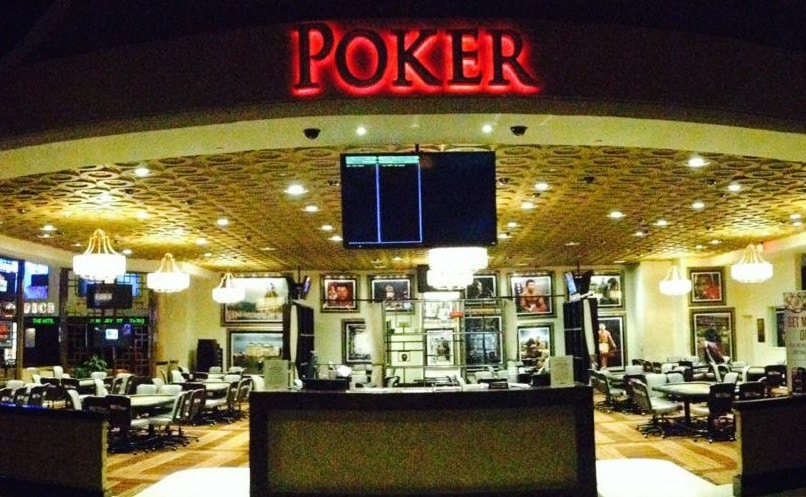
The lack of a staff member at the desk here simply reflects the fact the room is closed. Note that for large poker rooms in Las Vegas, it is rare for them to “go dark” (close). Most operate 24/7 provided there are people who want to play.
To get in a game, you simply ask the staff member at the desk. As in the phone-in case, give them your name and the stakes you want to play. They will either put you on a wait list, or have a staff member walk you to an available seat. If you used the phone-in option, you’ll see your name on the monitor, typically with some symbol noting you’re a phone-in. In this case, just let the staff member at the podium know you’ve arrived. You’ll again either be shown to your seat, or activated on the live wait list. In the latter case, wait until your name is called, then present yourself at the desk to be shown to your seat.
I Need Poker Chips!
You have been escorted to your seat and now need poker chips. How do you get them? Different rooms handle this in different ways.
One common possibility is that the member of floor staff who showed you to your seat will handle the transaction. “How many chips can I get you?” is a sign for you to give them cash. Nearly all low-stakes games have a minimum and maximum buy-in. For simplicity, you might choose to buy in for 100bb, so $200 in a $1/$2 game or $300 in a $1/$3 game. In Las Vegas, that will always be within the buy-in limits. (The cap is typically lower in L.A., as we detail in this article.) Ultimately your buy-in amount is, of course, up to you, provided it is within the bounds set by the room.
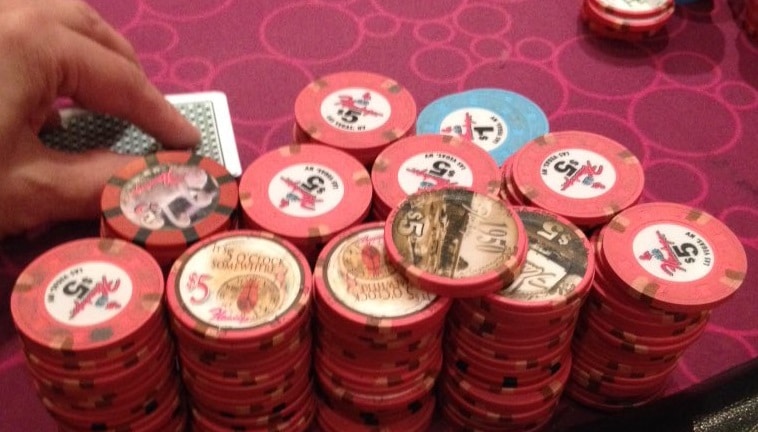
Some rooms will provide you with chips at the podium before you are taken to your seat. This strikes us as the most efficient and simple method and we would like to see more of it. At the other end of the customer service spectrum is the mercifully rare option of staff asking you to get your own chips at the “cage.” The only benefit we see for the customer in this practice is that you’ll know ahead of time where to cash out your winnings.
If floor just dumps you at your seat and whizzes off, simply sit down and wait for the dealer. Have your cash out and available. They may sell you chips out of the tray in front of them, or in some of the larger rooms call for a chip runner. In the latter case, a staff member will appear on your shoulder and again ask how many chips they can get you.
As soon as you have sat down, you may be asked by the dealer if you want a hand. In many rooms, you can be dealt in even if you don’t have any chips, and if you play the hand the dealer will have cunning ways of tracking your bets until your chips are brought by a runner.
We recommend declining this option on your first visit. You are likely feeling a little nervous, and playing a hand in an unfamiliar manner without chips is likely going to add to the stress. Simply inform the dealer “I’ll wait for my chips.” This is perfectly acceptable and gives you a chance to get acclimatized.
Your other initial interaction with the dealer may be them asking you for your player’s card. If you have one, hand it to them and they will “swipe you in” to the tracking software. We explain why having a player’s card is advantageous below.
Congratulations. You are now sitting in your first public poker game. Before you put your poker skills into action, here’s something to keep in mind. You belong here as much as everyone else sitting at the table. Sure as a rookie you’ll be nervous. You may not play your best. You may even make some mistakes like betting out of turn or not realizing it’s your turn to act.
Don’t worry about it. Everyone else at the table has been through this process. Many of them will recognize you’re a nervous rookie. Some may regard you as an easy source of chips. Okay. Disappoint them. Others will be genuinely interested in making sure you have an enjoyable experience. Even grizzled veterans want rookies to come back, either for selfish fiscal reasons, but more often because they love the game and want to see it thrive.
Before moving on to the “dos and don’ts” of casino poker, here’s a quick aside. You may be aware that so-called “entry-level” games in U.S. casinos are either $1/$2 or $1/$3 blinds. Does this difference matter? Should you favor one over the other on your first casino trip? In the quick video below, SplitSuit discusses the two different limits.
Some Casino Poker Dos and Don’ts
If your live poker experience is currently restricted to casual home games, there are several elements of casino poker that you will find run rather differently. This covers the spectrum from important enforceable rules, to more subtle areas of etiquette. You naturally do not want to break any rules, and following good etiquette is highly advised. More seasoned players will usually be forgiving of mistakes, but if you repeatedly break the social conventions of a public poker table, neither you nor anyone else is likely to end up happy.
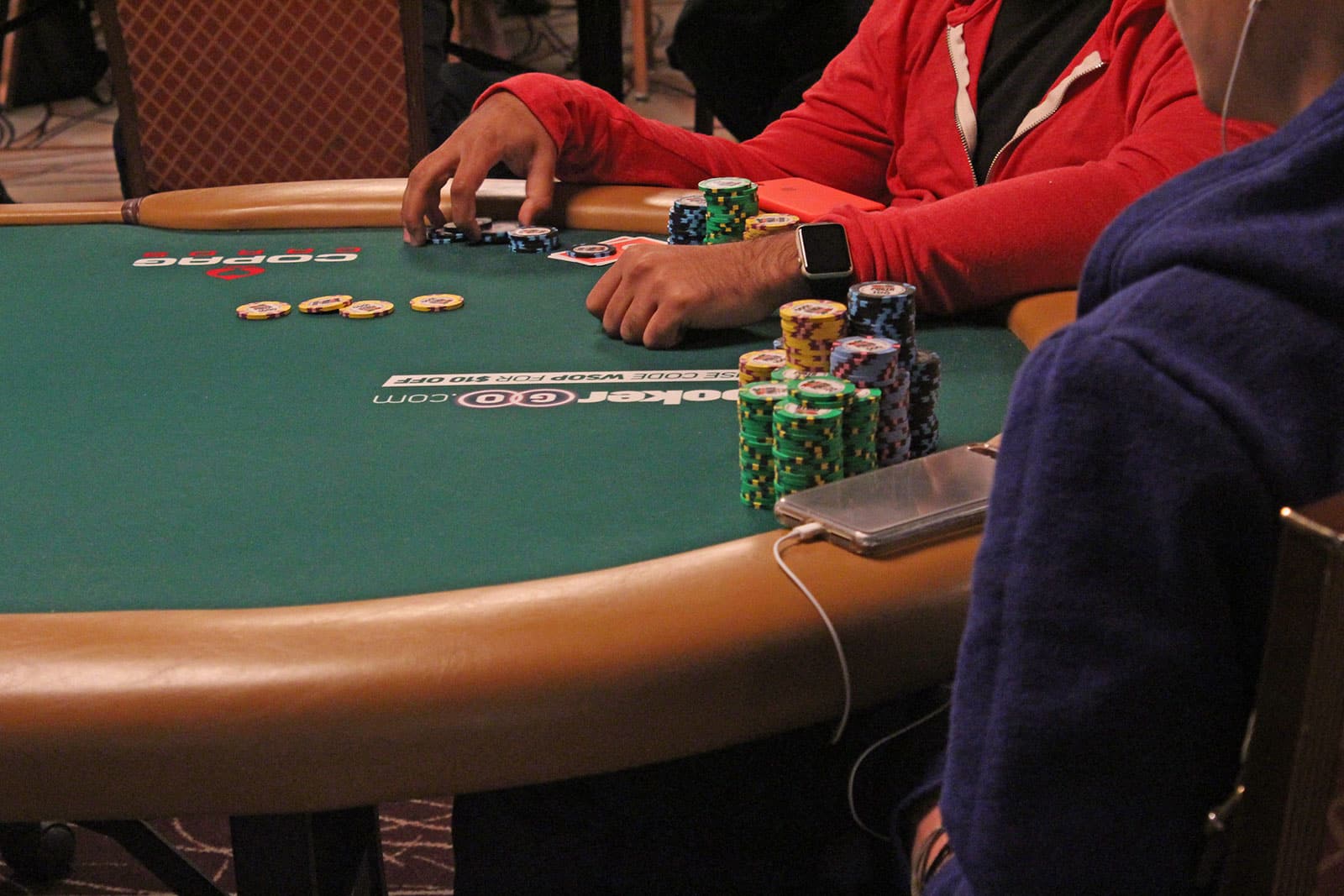
Do make sure you are comfortable at the table
A live casino poker table typically seats nine players. The table size is a compromise between the comfort of the players and the ability of the dealer to sweep in chips and cards from their seat in the dealer “box.” If players space themselves evenly, everyone should have enough personal space and be comfortable. Unfortunately, that is not always the case.
If you feel you’re being crowded by neighbors, there’s a simple solution that avoids pointing out a specific opponent as responsible for the problem. Between hands, ask the dealer if they can “square up the table.” The dealer is well-placed to see what the problem is, and it is their responsibility to rectify it when asked.
Do tip your dealer (but don’t go crazy)
Tipping is a touchy subject, and one that is ultimately up to the discretion of each individual. We are also aware that in some jurisdictions outside the U.S., tipping dealers is actually illegal. However, in the U.S. in particular, a dealer’s base salary is low. Thus while one can debate whether this situation should be solved by casinos paying them more, at the present time they are largely dependent on tips.
So how much should you tip your dealer? Do you tip every pot?
One useful guideline is to tip for time and service. If a dealer is running the table well, keeping the mood light and getting out plenty of hands, many players are more inclined to tip them generously. You don’t have to tip every hand however, particularly if you take down a small pot preflop. That has taken up little of the dealer’s time, and you haven’t won much.
What about those really big pots? You’ll sometimes see a player stack an opponent for, say, a $1000 pot, and toss the dealer $15 or $20. Such individuals are, of course, free to do so. Further, we don’t wish to take money out of dealers’ pockets given that without them there is no game.
Equally, we would suggest there is no need to feel pressured into tipping big simply because others at the table are doing so. If you win a big pot and the hand took a long time to play out, perhaps because you had a long think on a difficult decision, then it’s perfectly reasonable to be generous. But we have spoken to many dealers, and nearly all appreciate a buck per average-sized pot as reasonable compensation and an acknowledgment of the service they are providing. If you up that a bit for bigger pots, they certainly won’t complain.
Do ask questions if you’re unsure of the action or a rule
Talking of dealers, they are responsible for running the game. This responsibility extends to answering questions players have about rules, and making sure that no rules are being broken. Perhaps most importantly for a casino newbie, they are there to help.
There’s a lot happening in a poker game, and for players new to a casino, it can be easy to lose track of what is going on. Here’s a common situation. You’re in the “one-seat” to the immediate left of the dealer. You cannot see if the players to the dealer’s right have acted, but you notice nothing seems to be happening. Don’t be embarrassed! Simply ask the dealer “where’s the action?” or “is it on me?”
Another common situation is an opponent pushes out a bet messily, or for some other reason it’s hard for you to see the bet size. The dealer will not announce the bet size typically, but it is their responsibility to count down the bet when asked. You need that information; the dealer is there to provide it.
No dealer is perfect, of course. Sometimes they will mess up a rule, or fail to follow the action properly. Equally, some are better than others at de-escalating arguments between players. In principle, such arguments should never happen. If one player has a problem with another, the issue initially should be presented to the dealer.
If for any reason you feel the dealer has not correctly handled a situation or interpreted the rules correctly, you should ask them to “call floor.” They are compelled by rule to meet that request. This allows a senior staff member to hear the problem and issue a definitive ruling.
You may be playing primarily for fun, but you’re also playing with money. One reason for playing in casinos at all is the protection such games provide to you. Take full advantage of that protection when appropriate.
Do familiarize yourself with any “promos”
To the right of the dealer sits “the alligator.” This is the hole in the table with a terrifying snapping mechanism down which the rake on each hand is deposited.
In many rooms, there is a second slot to the left of the dealer. Chips dropped in here go to the room’s “promo fund.” This is money that is paid back by the room to players through various promotions.
If you see this second slot, it’s a good idea to find out what exactly the promo is. For example, it may be that every hour the highest hand made in the room gets paid out some fixed bonus. You want to know about it in case you hit that high hand. Other common promos include “freerolls” in which a certain amount of time played gets you an entry into a free tournament.
Since these promos are designed to attract players to the room, most are displayed fairly prominently. However, if you see money being dropped into the promo slot, but can see no explanation of what the promo is, the dealer is again there to help. Equally, if your neighbor looks like they might be amenable for a chat, you can ask them. It can be a good way of breaking the ice and increasing your comfort.
Do change seats or tables if you wish
It’s quite possible, as well as reasonable, for you to want to be as anonymous as possible during your first casino game. You’ve been given a seat in a game you want to play, and to avoid any further complications you’re happy sitting in it.
There are, however, a range of reasons why you might wish to change seats or even tables to enjoy your visit more. What are some of those reasons?
The first may sound silly, but it does crop up. Not all poker players observe the best personal hygiene. If your neighbor stinks, ask the dealer for a seat change button. If there is an open seat, you can ask to move into it immediately. The button gives you first refusal once a seat opens up.
If your eyesight isn’t the greatest, you’ll likely find it’s easier to see the board cards from some seats than others. Again, this is a good reason for requesting a seat change.
There are also a host of tactical reasons why you might want to change seats. Such considerations are beyond the scope of the present article, but you will likely learn about them if you study poker theory through resources such as those we provide through our subscription services.
What about changing tables? You can do that too! This is usually handled at the podium or by a floor person in the room. You can either ask to be moved to a specific table once a seat is available, or if you simply want to get off your current table, you can request “first available.”
Again, why you might want to do this is mostly beyond the scope of the present article, but it could be something as simple as wishing to sit at the same table as a friend.
Do top off
Online poker includes the useful feature of “topping off” our stack to some predetermined amount after we lose a hand. In a live setting, it’s impractical to be feeding chips back onto our stack constantly.
That said, most poker training material is focused on 100bb stack depth. Consequently, if we have lost a few hands after buying in for 100bb, it is generally to our advantage to add to our stack to get us close to our regular buy-in.
But never top off when you have a live hand. That is against the rules. You can only go “back to your pocket” between hands. In other words, while the name “no-limit hold’em” suggests there is literally no limit to what you can bet, the game is actually played for “table stakes.” You can only bet what is in front of you. Further, when two players get all in, the money risked is always the shorter stack.
If you would like more information on this topic, please check out the following video:
Do act fast
Within the poker industry, it is generally agreed that the explosion in television and streaming coverage has been good for the game. However, it hasn’t happened without a cost.
A lot of the poker you see on television involves large tournaments. Some of the decisions in these events are for genuinely large amounts of money. It is reasonable for players to take a significant amount of time on such decisions.
Unfortunately, there are some “TV pros” who take ages over even trivial decisions because they are mugging for camera time. Others have concluded they have to “balance” their thinking time, and thus will take thirty seconds to make a completely trivial preflop fold.
Please don’t emulate this behavior. You’re not on television, and even if you were, most of this nonsense is plain rude. If you get dealt 94o under the gun, it should be in the muck before the big blind has received their second hole card.
Don’t act fast
Wait, what?
If a decision is trivial, particularly a preflop fold, act fast. If the pot has grown, it’s okay to slow down a bit. Sometimes you’ll do this because you’re simply trying to figure out the best play. For example, on the river your opponent shoves all in. Do you call? Not only are such decisions for significant money, they often require reconstructing the hand to figure out if you’re good or not. It’s fine to take time in such spots.
Further, there are some spots when you know exactly what you’re going to do, but a little deception produced by having an apparent think may be to your advantage. Again, the river provides an example. Your opponent has bet into you and you’re holding the nuts. Stacks are such that your inevitable raise will be all in. But you want to get paid off. These situations come up relatively infrequently, but do provide examples where a “fake think” is justified.
But how long is too long to make a genuinely tough decision? At some point, you will simply find that there is no additional information for you to factor in to your decision. If thinking isn’t clarifying anything, just go with your current best guess.
There is a mechanism that terminates this thinking process. In principle, anyone at the table can ask for “clock.” This requires the dealer to call floor and inform them clock has been called. Floor will then ask the dealer if the person with the decision has had sufficient time to reach one. The dealer invariably says yes, and floor then starts a sixty-second countdown. If the player does not act within that sixty seconds, their hand is declared dead and their opponent is awarded the pot.
When you’re new to casino poker, we would suggest you never call clock on anyone. Typically someone else will do it anyway if the player is acting unreasonably slowly.
Don’t splash the pot
In some home games, players will toss their chips into a central pot whenever they bet or raise. Never do this in a casino.
When playing casino poker, your bets should be placed in front of your cards. Some casino poker tables have a “betting line” across which bets must be placed. This mechanism ensures that all bets can be easily tracked by the dealer, and prevents anyone from “shorting” the pot by throwing in insufficient chips.
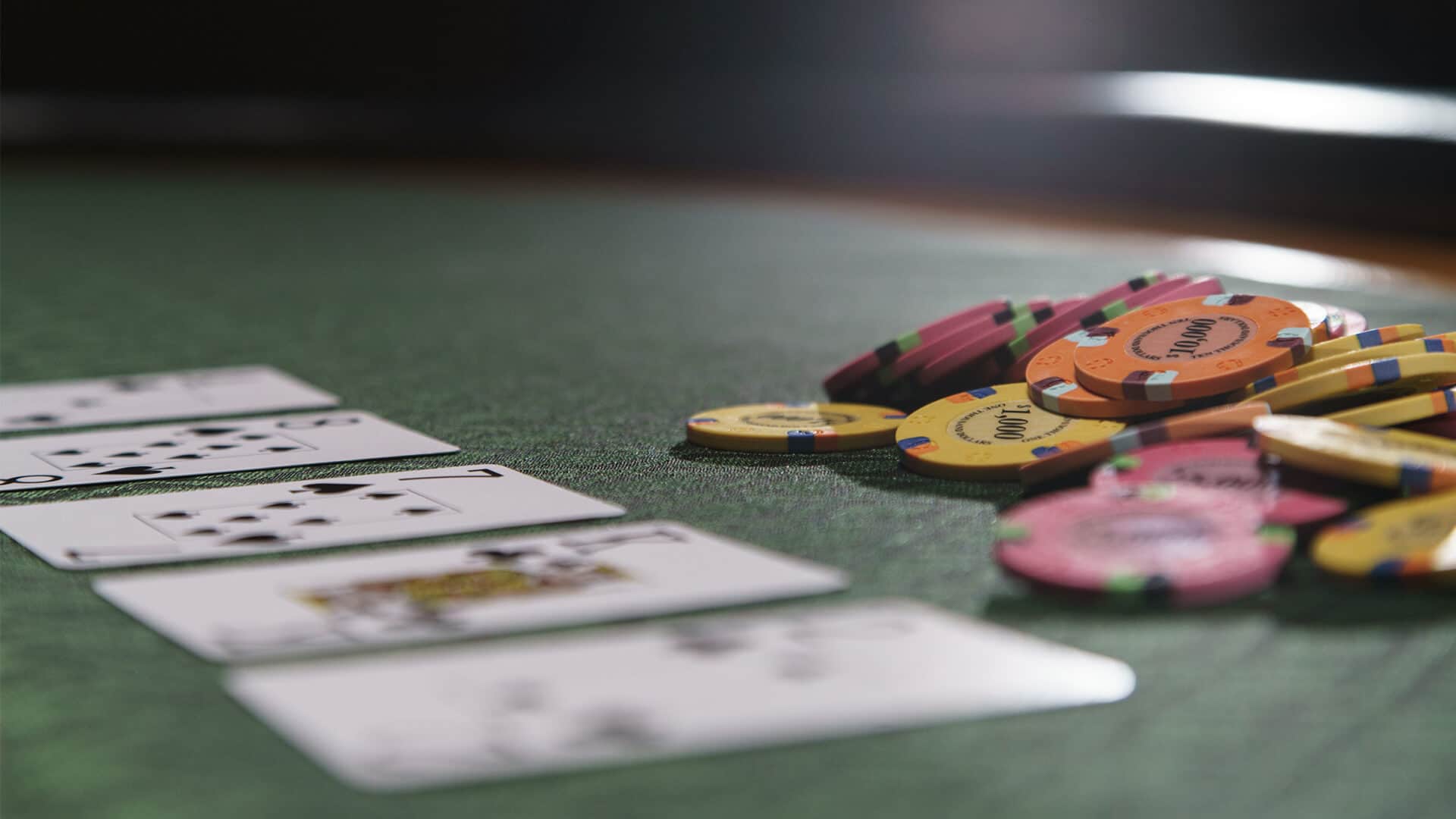
At the end of each betting round, the dealer checks all bets are correct, and only then scoops them into the pot above the board cards. This is an excellent procedure that preserves the integrity of the game, and one which should never be violated. Even if you’re Teddy KGB.
Don’t talk about live hands
Another feature of many home games is the friendly banter during hands. It can be considered acceptable in such games for players to speculate on what others are holding, whether someone is bluffing, and so on.
This is a massive no-no in a casino game. Again, the reason is to protect game integrity. Casino poker rests on the concept of “one player to a hand.” If someone is thinking about calling a river bet, and you observe “maybe the bettor is bluffing!” you are influencing the action. You may cost someone a large pot.
The only time it is permissible to discuss a live hand is when the pot is heads up (two players) and you are one of the players still involved in the hand. Even in this scenario, we would suggest less experienced players would do well to say nothing at all. There are those that defend “speech play,” claiming it is an integral part of poker. We would suggest that it is mostly an annoyance that slows down the game.
Don’t slowroll
You fire out a big river bet holding the stone cold nuts and your opponent reluctantly calls. What do you do next?
You table your hand as fast as possible!
It may be regarded as fun amongst friends to slowly reveal your hand (“slowroll”), thereby adding some sort of drama for the others at the table while needling your opponent. In a casino game it is the worst possible etiquette. Never do this.
Don’t hide big chips
This is an enforceable rule rather than a point of etiquette and is particularly important in poker tournaments. It is required that you arrange your chips so that your opponents can reasonably eyeball them to get an idea of how much you are playing. You will occasionally come across an “angle shooter” who will tuck large denomination chips behind smaller ones, thereby disguising how much they have.
Why would someone do this? There are many situations in which someone with a strong hand would like their opponent to believe they have a much shorter stack. Such an opponent may, for example, feel committed for $200, but not the five black chips ($500) our miscreant has hidden behind their reds. Make sure your large chips in particular are visible at all times.
Don’t String Bet
One final enforceable rule we should mention is the string bet. Hollywood seems largely responsible for this one being an issue. It works like this.
The cowboys are sitting at a rickety table playing cards and drinking red eye. One of them puts out a bet. Their opponent stares at them menacingly, then announces:
“I call your one hundred, and raise you three hundred!”
If you do this in a casino, you have just made a string bet, and your raise will not count. As soon as you announce “I call your one hundred,” you have done precisely that: called the bet.
Where does this rule come from? The idea is that by breaking our action into two stages, we may elicit a “tell” from our opponent. If, for example, they appear disappointed they got called, we may reasonably assume that it’s a sign of weakness and attack them with the additional raise.
Or maybe it’s simply that it’s overly theatrical, and we want to keep the game moving.
Don’t panic!
We sincerely hope that, in attempting to anticipate your questions and concerns for your first casino poker experience, we have not inadvertently intimidated you more. So let’s recap an important, central point.
The job of your opponents at any poker table is to win your money. However, most of them will spot a casino rookie in a heartbeat, and the majority will be friendly and helpful.
Your most important resource is the dealer. It is their responsibility to make sure you know what is going on, that the game is fair, and that your interests are preserved to the same degree as everyone else’s. So ask questions, be polite, and enjoy yourself.

How do I sign up for a poker tournament?
The above discussion explicitly focused on the sign-up procedures and basic casino rules for poker cash games. In many ways, poker tournaments are rather easier in their mechanics, but there are a few differences which we now outline.
The starting point for tournaments is the same as cash games. Figure out where you want to play, and present yourself at the podium. Some of the larger poker rooms have a dedicated tournament sign-up area to which you will be directed.
Rather than buying chips, you buy an entry into the tournament. You will be handed a seat card that gives a table number and seat number. Any poker room employee will be able to direct you to your seat if you need assistance.
Typically the dealer at your table will ask for your seat card. Sometimes they also require to see your ID. The dealer will then push you the appropriate starting stack for the tournament. We recommend you count it down. Mistakes are rare, but can happen. Once that is taken care of, all you have to do is win the tournament!
Perks of playing poker in a casino
When you play cash games in a casino, you end up paying about $10/hour in rake devoured by the alligator discussed above. We suggest this is a reasonable price to pay for entertainment, but you can sweeten the deal further simply by taking advantage of things the casino is trying to give you.
Player’s Card
We mentioned above that part of the process of getting seated at your table may include the dealer asking for your player’s card. Once you’re “swiped in,” the amount of hours you play at the table is logged. This is important if you’re trying to qualify for promos based on hours played, but there’s an added bonus.
Poker rooms typically pay you $1-$2/hour to sit in their games. They’re basically giving you a rebate on your rake. This rebate accumulates in the form of “comps” or complimentary dollars. These are commonly used for food, as well as for merchandise in the casino stores.
We understand that some of you like to live as far off grid as possible. That’s fine. Few casinos require you to use a player’s card. Equally, most casinos in Las Vegas at least have some really good restaurants. You would be surprised how quickly you can rack up enough comps for a lovely meal for two, particularly as a dedicated grinder.
Food And Drinks
In addition to food generated by comps as described above, some casinos will also provide you with free food by playing in their larger games. They want you paying rake in their room, and if they can encourage that by supplying you with a free dinner, they’ll happily do so.
Many casinos also provide free drinks while you are seated at the table. In Las Vegas, the priority here is simply to remain hydrated. As a poker training site, we don’t recommend mixing your drinks with poker, but that decision is really none of our business. We do have a few stories, however, of people who ended up paying several hundred dollars for a “free drink.”
There are many other resources for preparing you for your first time playing poker in a casino. Watching cash games online allows you to see the mechanics of play, as well as giving you an idea of the pace and feel of a live game. And if you want some tales from the felt involving entry-level games, you will likely enjoy SplitSuit’s $1/$2 poker vlog.
Good luck, have fun.
Leave a Comment
You must be logged in to post a comment.

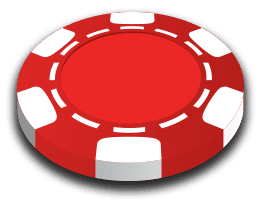
You have hit the mark. In it something is also I think, what is it good idea.